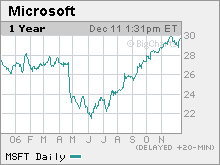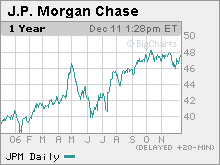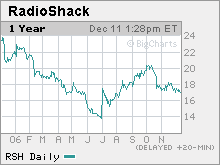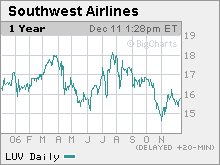Joy Global (JOYG)

Joy Global makes equipment for the mining industry, coal mining in particular. When commodity prices were soaring, so were Joy's shares - from $5 in January 2003 to $70 last April. But when prices began to fall, investors fled. As with many selloffs, this one was grossly overdone. Even with coal and copper prices now 25 percent off their midyear highs, analysts still expect Joy's earnings to grow 22 percent next year. "Yes, the price of coal has taken it on the chin," says portfolio manager and Joy fan John Buckingham of the Al Frank fund. "But the dropoff in its business didn't justify the huge decline in the stock price." As a result of the decline, the stock looks cheap - trading at a modest 15 times 2007 earnings.
CEO John Nils Hanson says Joy Global's earnings aren't nearly as sensitive to swings in coal and copper prices as Wall Street seems to believe. His customers don't decide to buy drills and electric mining shovels based on a six-month rise or fall in prices. "A copper mine can be a 40- or 50-year investment," he says.
Hanson considers China to be Joy's most promising market. China produces about two billion tons of coal annually, double the U.S. output, and the Energy Information Administration predicts China's demand for coal will triple by 2030. Roughly half of China's coal is mined without mechanized equipment (i.e., by hand, with picks and shovels). Joy expects revenue from China to hit $500 million by 2010, up from $200 million last year.
Microsoft (MSFT)

Tech junkies and media sophisticates love to blast Microsoft as an ailing dinosaur that's stuck in the pre-Internet era of the desktop PC. But shares of the software giant have been attracting an unlikely collection of exceptional investors. One is value veteran Marty Whitman at Third Avenue Funds, who purchased two million shares earlier this year, noting that the stock was selling for less than 15 times earnings (after deducting its cash holdings from the market value). On the growth side are the talented managers at the Jensen Fund, who also purchased a large position recently. Co-manager Bob Millen says Microsoft has everything Jensen's managers look for in an investment: high return on equity, robust earnings growth, growing free cash flows, and formidable competitive advantages.
Microsoft is launching the broadest barrage of new products in its 30-year history. In November it released Vista, the new version of the Windows operating system, and Office 2007, an upgrade of the popular software suite. Both businesses average operating margins of more than 70 percent, and they generate about 80 percent of Microsoft's total profits. And with Windows running on more than nine out of every ten computers in the world, the market is enormous. Other new products: everything from business servers to the new Xbox videogame machine.
After several stumbles, there's also evidence that Microsoft is getting Internet religion. In October the company struck a deal with Novell, a longtime enemy that is now a proponent of Linux, the open-source operating system that competes with Windows. The agreement makes it easier for customers to use both Windows and Linux software alongside each other on big computers, essentially brokering a peace between two opposing camps in the software industry.
Don Yacktman, another recent buyer, points out that the company has returned more than $90 billion to shareholders in stock buybacks and dividends over the past few years, a trend he says will continue. Says Yacktman: "Despite selling at one of the lowest price/earnings multiples in our portfolio, Microsoft possesses potentially the strongest platform for growth of any company we own."
J.P. Morgan Chase (JPM)

When J.P. Morgan Chase purchased Bank One in 2004, it also acquired the considerable management talents of that company's CEO, Jamie Dimon, who had turned around what was arguably the worst-run big bank in the country. Since taking the helm at J.P. Morgan, the brash Queens native has largely followed the same playbook he used at Bank One - installing new managers, meshing computer systems, and axing pricey outsourcing contracts. His efforts are paying off. Led by its robust investment-banking and wealth-management arms, the company is expected to report a 25 percent jump in earnings in 2006.
There's more upside to the turnaround. Chris Davis, who owns 72 million shares at Davis Funds, points out that the company is made up of a collection of businesses that can grow faster than the global economy and have room to improve both market share and profit margins. A quick way to look at the potential is to compare the return on equity - a key measure of profitability - of J.P. Morgan Chase and Citigroup. In 2005, Citigroup's ROE was 17.5 percent while J.P. Morgan's was 10.5 percent. To Davis, the gap means that J.P. Morgan Chase has "significant potential" to boost its profits.
The stock sells for 12 times projected 2007 earnings, roughly in line with industry rivals Citigroup and Bank of America; it yields 2.9 percent. Assuming 10 percent annual revenue growth over the next several years and continued savings from the merger, Morningstar analyst Craig Woker figures shares are worth $61.
RadioShack (RSH)

We know, we know. What the heck is a dog of a stock like RadioShack doing among Fortune's top picks? We had our doubts too when Bob Olstein - a fund manager obsessed with quality of earnings and good corporate governance - touted RadioShack as his favorite stock for 2007. "The next J.C. Penney," he called it. Not unlike Penney in the late 1990s, RadioShack has been a basket case of late, doing little to update its stores even as it lost market share to Best Buy and other retail rivals. RadioShack's earnings have been cut in half since 2000, and its stock price has shrunk 75 percent. To top it all off, CEO David Edmondson was forced to resign last February after it was revealed that he had fabricated parts of his résumé. The failure to vet Edmondson's credentials was a huge embarrassment for RadioShack's directors, but they redeemed themselves in choosing his replacement, retail industry veteran Julian Day. Kmart's CEO during its turnaround, Day came onboard in July, and Olstein - whose Olstein Funds owns 1 percent of RadioShack - sees early signs of progress, noting that debt, inventories and accounts receivable are all coming down.
Given Day's reputation as a shrewd cost cutter - at Kmart he turned a $5 million quarterly loss into a $155 million profit in one year - Olstein believes RadioShack can grow earnings from a projected 73 cents a share this year to $2 or more by 2008 or 2009. Apply a market multiple to $2 a share in earnings, and you get $35 - double the current stock price. And RadioShack is the kind of fixer-upper private-equity firms love to buy.
Day hasn't said much publicly about his plans, but Kaufman Brothers analyst SooAnn Roberts says that beyond closing less profitable stores and trimming payroll, it's clear what RadioShack needs to do: reduce the clutter, improve customer service, and scrap oddball electronics like metal detectors and CB radios to create more shelf space for what's hot. Roberts thinks the turnaround is doable, although she's the only analyst who rates RadioShack a buy. As for Olstein, he recalls that nobody liked J.C. Penney either when he started buying it in 2002 at $20 a share. Four years later he'd quadrupled his investment.
Southwest Airlines (LUV)

It has been quite a year for airline stocks. American Airlines shares are up 26 percent; US Airways, 33 percent; and Continental Airlines, 70 percent. The exception, ironically, has been the carrier that makes the most money: Southwest Airlines. Despite a 25 percent increase in earnings, Southwest stock was down 3 percent as of early December. The cut-rate carrier now has a 2007 P/E ratio of 16, its lowest in years. Bottom line: It is an ideal time to buy one of the best-run companies and best-performing stocks of the past 30 years.
Explanations for why Southwest has fallen out of favor just don't hold up under scrutiny, according to Citigroup analyst Andrew Light. One concern is that the airport hassles and heightened security measures that dented third-quarter earnings - a byproduct of the British airline terror plot - will extend into 2007. The reality is that things are pretty much back to normal, as evidenced by the 12 percent rise in Southwest's revenue passenger miles (a key airline metric) in both October and November.
Another worry is that Southwest's cost advantage is narrowing. In fact, Southwest's cost advantage over traditional carriers is still substantial. Thanks to superior hedging, Southwest will pay $1.54 a gallon for jet fuel in 2007, vs. $1.91 for American and JetBlue, Light estimates. Southwest's nonfuel costs are on average 30 percent lower than those of its major rivals.
Perhaps the biggest concern of all is that Southwest is now too big to keep growing at a high rate, an assertion that CEO Gary Kelly fiercely rejects. "Our growth opportunities are as strong in the near term as they've been in years," he says, pointing to new revenue sources such as cargo; new markets like Denver, Philadelphia and Fort Myers, Fla.; and the potential to capture routes, gates and passengers from competitors going through mergers or bankruptcies.
What's the endgame for Southwest? Morgan Stanley airline analyst William Greene envisions a future in which Southwest is able to increase its market share in the U.S. to a stunning 50 percent, from 17 percent today. "Southwest's low fares and leading cost structure would likely foster an environment where it would be difficult for carriers to justify significant capacity additions if their costs were substantially higher than Southwest's," Greene wrote in a recent report. "If we're right about the future of the U.S. airline industry, Southwest's profits and share price are likely going much, much higher." Nothing wrong with up, up and away.
Quelle: CNN.com